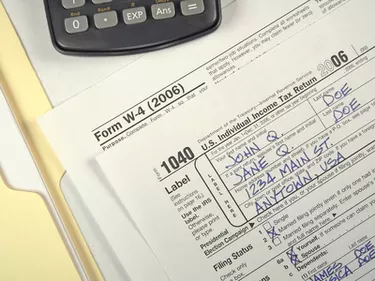
Folks who itemize deductions on their tax returns can claim property taxes. However, a cap on the size of this deduction, coupled with a relatively high standard deduction, may mean that you'd save money by not itemizing. The IRS advises that you work out your deductible expenses, including property taxes, on 1040 Schedule A to see whether they produce a smaller tax bill.
Read More: How Does Property Tax Work?
Video of the Day
Video of the Day
Property Taxes 101
Many state and local governments tax property, including real estate and other personal assets, such as boats, cars and recreational vehicles. Each taxing authority sets its own rules and rates for non-business property taxes. For these taxes to be deductible on your federal return, they must be:
- Used for general community or governmental purposes.
- Calculated based on the market value of the property. Typically, assessors use one of three methods to estimate market value: Comparable sales, replacement cost or the income it would generate if rented.
- Assessed at a uniform rate within a locality and charged to you yearly, independent of the collection schedule.
- Paid by the property owner during the tax year. The deduction of property taxes prepaid for the following year must wait until that year's return.
Read More: Why Do State and Federal Governments Collect Taxes?
Federal law caps the individual deduction of state and local income, sales, and property taxes at a combined total deduction of $10,000 ($5,000 if married filing separately).
Nondeductible Property Taxes on 1040
Not all property-related expenses are deductible, including:
- Costs based on a specific improvement benefiting one home, such as loan payments for government-approved home energy improvement programs. Interest paid on the loan may be deductible as mortgage interest.
- Taxes for improvements to sewer lines, sidewalks and streets, although these can be added to the cost basis of property.
- Homeowner's association fees.
- Transfer taxes on the sale of property.
- Service charges for sewer, water and trash collection.
- Property taxes paid on someone else's property.
- Foreign taxes paid on real estate.
- Any seller's delinquent property taxes paid when buying property (part of the property's cost basis).
- Flat fines assessed by local law for noncompliance. For example, a penalty paid for not mowing your lawn.
You should also review the escrow payments you made during the tax year. Typically, your monthly mortgage bill contains an escrow item where you prepay property taxes, homeowners' insurance, mortgage insurance, and possibly flood insurance. You cannot simply deduct the property tax portion of the escrow bill. Instead, you must ascertain how much of the escrow money was actually paid to the taxing authority during the tax year.
Standard Vs. Itemized Deductions
The 2018 Tax Cuts and Jobs Act implemented specific reforms that enhanced the value of the standard deduction relative to itemization. For 2022, the standard deduction is $25,900 for joint filers, $19,400 for heads of households and $12,950 for single filers or married filing separately. For itemization to be financially advantageous, your total itemized deductions, including those for property taxes, sales taxes, medical bills, state income taxes, mortgage interest, charitable donations and so forth, should exceed your standard deduction.
Be aware of all caps on deductions, including the $10,000 limit on state and local tax deductions and the mortgage interest deduction restriction, limiting the deduction to the interest on the first $750,000 of the loan; $375,000 if you are married filing separately.
Claiming Property Taxes on the Tax Return
You can claim state and local tax payments on Schedule A of Form 1040. You should subtract any property tax refunds you receive during the year from your payments. For example, if you sell your house during the year, real estate taxes charged to the buyer are a refund to you. If your itemized deductions exceed your standard deduction, transfer the total from Schedule A to Form 1040.